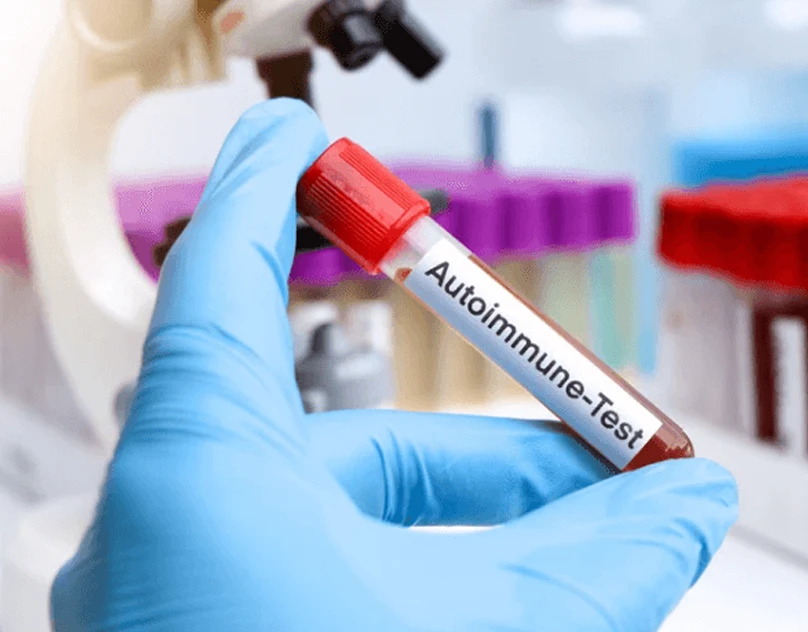

Genetic Testing for Early Insight into Autoimmune Diseases
- Learn Genetic Link, Why Autoimmune Diseases Run in Families
- Traditional Approaches to Diagnosing Autoimmune Diseases
- Tests for Autoimmune Diseases, and Know How Genetic Testing Helps
- Advanced Genetic Testing for Autoimmune Disease: Beyond the Basics
- Benefits of Genetic Tests for Autoimmune Diseases
- Limitations and Ethical Considerations
- The Future of Tests For Autoimmune Diseases, While Opting Advanced Genetic Testing for Autoimmune Disease
Autoimmune diseases are known to be some of complex issues where you might not have that immune system. It is well designed for protecting the invaders, mistakenly attacking those healthy conditions. This can also lead to a wide range of symptoms which shall affect various organs, leading to chronic pain, fatigue, and inflammation. Imagine the body’s defense system might get completely confused and turning on itself. That is essentially what happens while tests for autoimmune diseases.
Such conditions are surprisingly common, affecting millions worldwide. While such exact causes are not fully understood. This is such a combination of genetic predisposition and environmental triggers this shall also believe to play a crucial role. This is where those genetic testing might come into the picture. It can offer a powerful tool for understanding that risk, while aiding diagnosis, and even guiding personalized treatment strategies.
Learn Genetic Link, Why Autoimmune Diseases Run in Families
Have you ever noticed about some of the health issues that shall all seem to run in the family? Autoimmune conditions are usually one of them. Such “familial aggregation” it not a coincidence; but it is about all those points to a strong genetic component. While there is not usually a single “autoimmune gene,” there are many genes, which are scattered across the chromosomes. They shall all contribute to the predisposition on learning tests for autoimmune diseases.
Human Leukocyte Antigen (HLA) system is known to be a prime example of some of the genetic influence. Those HLA genes are known to be critical for some of the immune system function. They can all help the body to differentiate between “self” and “non-self.” Some of the genes are also not strongly linked to an enhanced risk for many autoimmune diseases.
For example, HLA-B27 is highly associated with ankylosing spondylitis, and some sort of HLA alleles like DQ8 and DR3 are tied to Type 1 Diabetes and Sjögren’s syndrome, respectively.
It is all important to remember that while having a genetic predisposition you do not need guarantee you will develop an autoimmune disease by yourself. This is just so simple means you are more susceptible. Environmental factors, including infections, diet, and even stress, can act as “triggers” that, when it is well combined with that genetic makeup, this might initiate such disease process.
Traditional Approaches to Diagnosing Autoimmune Diseases
Before you are to dive into any sort of genetic testing, it is quite well to understand some of the traditional diagnostic methods for autoimmune issue.
- Clinical Evaluation: The doctor shall take a detailed medical history, which might include the symptoms, family history, and any relevant environmental exposures. They will all perform a physical examination while looking for several signs of inflammation or organ involvement.
- Blood Tests for Autoantibodies: It is a hallmark of autoimmune condition, and it is the presence of autoantibodies. This might include all those proteins that are well produced by the immune system which shall mistakenly target your own tissues. Some of the common tests are mentioned below:
- Antinuclear Antibodies (ANA): It is usually a first-line test for numerous autoimmune conditions including lupus.
- Rheumatoid Factor (RF) and Anti-cyclic citrullinated peptide (anti-CCP) antibodies: They are important markers for conditions such as Rheumatoid Arthritis.
- Thyroid peroxidase (TPO) and thyroglobulin antibodies: Used to tests for autoimmune diseases, where thyroid conditions including Hashimoto’s thyroiditis and Graves’ disease.
- ESR (Erythrocyte Sedimentation Rate) and CRP (C-Reactive Protein): These are those inflammatory markers which can indicate general inflammation.
- Imaging Studies: X-rays, MRIs, and some of the other imaging techniques can all help in assessing that organ damage or inflammation.
- Biopsies: In some of the cases, a tissue biopsy is a must for confirming that diagnosis well which can further help with tests for autoimmune diseases.
While such traditional methods are needed, they often provide a snapshot of the disease once such mentioned symptoms have manifested. Genetic testing, on the other hand, can offer a great insight into the predisposition long before symptoms might occur to you.
Tests for Autoimmune Diseases, and Know How Genetic Testing Helps
Genetic testing for autoimmune diseases does not look for a single “autoimmune gene.” Instead, this shall all focus on identifying specific genetic variants or mutations which is well associated with an increased risk. Such mentioned tests for autoimmune diseases can be broadly categorized into a few types mentioned below:
Panel Testing
What it is: It helps to examines a select group of genes that are associated with specific autoimmune diseases or a cluster of related conditions. It is just like looking at a specific chapter in a book, which can focus on the most relevant information.
How it helps:
- Targeted approach: If there was a strong family history of a particular autoimmune disease. This is a panel tests for autoimmune diseases can specifically look for the genetic variants that are all linked to that condition.
- More affordable: Generally, less expensive than some of the broader sequencing methods, as it analyses fewer genes.
- Diagnostic confirmation: Can help in confirming some of the suspected diagnosis, which shall especially in cases with unclear symptoms.
Limitations: If some of the specific genetic variant is not on the panel, it will not be well detected. A negative result on a panel test doesn’t necessarily rule out a genetic predisposition if the variant is not well covered.
Whole Exome Sequencing (WES)
What it is: WES like condition can all go as a step further than panel testing by sequencing all the exons in the genome. Exons are known to be those protein-coding regions of the genes, which shall further make up about 1 to 2% of that entire DNA but it is also known to contain most known disease-causing mutations. Such think of it as reading all the significant sentences in every chapter of the book.
How it helps:
- Broader coverage: WES like condition can further identify some of the genetic variants in genes which shall not be included in some of the smaller, targeted panels. This is all about some useful things with respect to the complex autoimmune diseases where multiple genes that are involved.
- Discovery of novel variants: Can sometimes be uncover genetic variants which is not previously linked to those autoimmune conditions but with a known function in the immune system.
Limitations: WES does not help to analyse the non-coding regions of the genome (introns and intergenic regions), which can also contain important regulatory elements. Interpreting several “variants of unknown significance” (VUS) can also be challenging.
Whole Genome Sequencing (WGS)
What it is: The issue WGS is the most comprehensive genetic test that are all available. It some of the sequences your entire genome, which includes both coding (exons) and non-coding (introns and intergenic) regions. It is all about reading every single word, punctuation mark, and those blank space in the entire genetic book.
How it helps:
- Most comprehensive view: Provides the help with most of the complete picture of the genetic makeup, which also offers insights into all types of genetic variations.
- Identification of regulatory variants: Can things that shall detect those variants in non-coding regions might all influence as how the gene are while turning on or off.
- Research and discovery: In several research setting, WGS is well invaluable for identifying some of the new genetic associations.
Limitations: The sheer volume of data generated by WGS can all be about complex to interpret and identifying relevant variants which can be quite well challenging. This is also the most expensive option.
Advanced Genetic Testing for Autoimmune Disease: Beyond the Basics
The field of genetic testing on choosing panel of Advanced Genetic Testing for Autoimmune Disease is rapidly evolving.
Genome-Wide Association Studies (GWAS)
GWAS involves analysing hundreds of thousands, or some millions, of common genetic variations (known as Single Nucleotide Polymorphisms or SNPs) across the entire genome. This shall be about large groups of people.
Functional Genomics and Gene Expression Studies
Some of the advanced approaches might all go beyond just identifying genetic variants to understand what those variants actually do. It shall also involve studying how genetic variations affect gene expression (whether a gene is turned on or off, and to what extent) and some of the protein function can be about a cellular level.
Immunosequencing (T-cell and B-cell Receptor Sequencing)
It is specialized form of sequencing analyses the genetic diversity of T-cell and B-cell receptors. Such receptors are well crucial for the immune system’s ability for recognizing and responding to specific threats. The autoimmune diseases, about such cells might mistakenly recognize self-antigens.
Benefits of Genetic Tests for Autoimmune Diseases
For some of the both individuals and healthcare providers, genetic testing shall all offer several compelling in advantages mentioned below:
Early Detection and Risk Assessment:
Genetic testing like help can all identify some of the individuals at a higher genetic risk. This helps in seeing even about some of the symptoms. This early insight shall all lead to some proactive monitoring.
Improved Diagnosis:
When some of the symptoms are simply vague or mimic other conditions. Help like genetic tests for autoimmune disease can provide crucial evidence which shall confirm an autoimmune diagnosis. This can lower those diagnostic delays.
Personalized Treatment Approaches:
The level of understanding about a person’s genetic profile all help can healthcare provider to tailor treatment plans. Some of the genetic markers shall further predict a better response to specific medications. They might also identify those who might experience adverse reactions. This can altogether move things closer to “the right therapy for the right patient at the right time.”
Family Planning and Genetic Counseling:
For several individuals with a family history of autoimmune disease, genetic testing like help can be well informed to the family planning decisions. Genetic counsellors which can also help in interpreting some of the outcomes and discuss several options.
Psychological Benefits:
For some, knowing their genetic risk can be quite well empowering. This allows them to take a more active role in managing their health and alleviating anxiety associated with undiagnosed symptoms.
Research Advancement:
Genetic testing shall be all about data contributes that is significantly about ongoing research. This can all lead to a deeper understanding of autoimmune disease pathogenesis and the development of some new diagnostic tools and therapies.
Limitations and Ethical Considerations
While powerful, genetic testing for autoimmune diseases is not working without some of the caveats:
Not a Definitive Diagnosis:
This is a positive genetic test outcome for a predisposition that does not mean you will definitively develop the disease.
Variants of Unknown Significance (VUS):
Sometimes, genetic tests like help can reveal variants whose clinical significance is not yet known. It can all lead to some of the uncertainty and anxiety while getting tests for autoimmune diseases.
Cost:
Genetic testing, especially advanced sequencing, can be expensive, which might be a barrier for some.
Emotional and Social Impact:
There are various things which can receive genetic risk information which can have emotional consequences.
Privacy Concerns:
Genetic information is highly personal. This helps in ensuring the privacy and security of this data which is the paramount.
Incomplete Picture:
Genetic tests for autoimmune diseases provide insights into inherited predispositions but this does not capture the full complexity of autoimmune diseases. These are known to be the influenced by epigenetics and environmental factors.
Therefore, genetic counseling is an essential part of the process. Getting genetic counselor on board for help to the individuals can understand the implications of test outcomes, which can discuss the limitations, and provide guidance.
The Future of Tests For Autoimmune Diseases, While Opting Advanced Genetic Testing for Autoimmune Disease
The landscape of advanced genetic testing for autoimmune diseases is continually evolving. This is all about promising even more sophisticated and actionable insights:
Integrative “Omics” Approaches:
Future shall all lay in integrating genetic data with some other “omics” technologies, this shall be all about proteomics and metabolomics. Such holistic view shall help in providing a complete picture of disease mechanisms.
Artificial Intelligence and Machine Learning:
AI and machine learning algorithms are well increasing while being used to analyse vast amounts of genetic and clinical data. This can all help to identify complex patterns, predict disease progression, and further on suggesting some optimal treatment strategies.
Gene Editing Therapies:
While some of the largely things in research phases, gene shall be about editing technologies, and this can hold immense promise for the treatment of autoimmune diseases. This goes on by precisely modifying genes which are well involved in immune responses.
Liquid Biopsies:
This non-invasive technique shall all involve some of the analysing about DNA fragments in blood. This can be potentially used for detecting some early signs of autoimmune activity or monitor conditions that are about progression with greater ease.
In India, the growing awareness of personalized medicine and advancements in genomics are making genetic tests for autoimmune diseases more prevalent. Companies are further offering a range of autoimmune diagnostic solutions, with panel tests for conditions including rheumatoid arthritis costing approx. INR 13,000. As the infrastructure and other expertise grow, one shall expect to see an even greater integration of genetic insights into those patient care.

Can You Inherit Migraine Risk The Truth About Women’s Brain Health
Can You Inherit Migraine Risk The Truth About Women’s Brain Health The Genetic Link to Migraines, It Is More Than Just Bad Luck Why Women are More...


Unlocking Your Body’s Blueprint: Genetic Clues to Pregnancy Complications and Hypertension
Unlocking Your Body's Blueprint: Genetic Clues to Pregnancy Complications and Hypertension The Intricate Dance of Genes and Health Decoding Pregnancy Complications Through Genetics The Genetic Roots of...

Education: Bachelor of Pharmacy (B.Pharm) from the Tata Institute of Social Sciences (TISS), Mumbai Experience: Agarwal is a seasoned pharmacist with over 7 years of experience in the pharmaceutical field. She has worked in various settings, including hospital pharmacies and community clinics, where she has excelled in medication management, patient counseling, and clinical support. Agarwal is known for her expertise in drug therapy optimization and patient safety. In addition to her practical experience, she contributes to health journalism, focusing on pharmaceutical advancements and health policy, and is involved in research projects aimed at improving medication practices and health outcomes. is known for her expertise in drug therapy optimization and patient safety. In addition to her practical experience, she contributes to health journalism, focusing on pharmaceutical advancements and health policy, and is involved in research projects aimed at improving medication practices and health outcomes.


